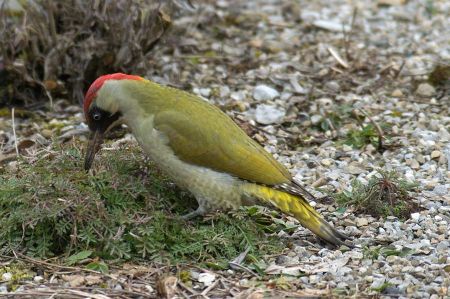Green woodpecker in "klü-klü-klü" happiness!
- Written by Portal Editor
Compared to the native woodpecker relatives, the green woodpecker is characterized as a “drummer” by its soft tones: Its “whirls” are unspectacular.
In return, the green woodpecker impresses the listener with loud territorial singing, which is not dissimilar to a high-pitched laugh. Its calls of "klu-klu-klu-klu" can now be heard as the 2014 Bird of the Year begins courtship. "Green woodpeckers prefer gnarled old trees for building nest holes," explains Peer Cyriacks, ornithologist at the German Wildlife Foundation. "The bird finds these mainly in parks, old housing estates and on meadow orchards."
Formerly part of village landscapes, meadow orchards are becoming increasingly rare today. Their care is expensive. Intensively cultivated orchards are more economical and time-saving to maintain. As a result, many meadow orchards have been abandoned. Today these habitats are among the most threatened biotopes in Germany. Not only fruit trees grow on meadow orchards. Insects such as wild bees, butterflies and hoverflies use herbs, grasses and perennial plants that grow on the traditional agricultural form of cultivation. The diversity in the small area is therefore a habitat for many animal species.
German Wildlife Foundation: The Bird of the Year 2014 also likes courting in meadow orchards
The green-speaker is bird of the year 2014. There are around 42,000 breeding pairs of it in Germany. He is a frequent guest on the meadow orchard in the wildlife country Gut Klepelshagen. The German Wildlife Foundation has been tending an old orchard there for years, measuring around two hectares. Over time, 80 old varieties of fruit have been planted and cared for by the foundation. In cooperation with ALNATURA, a company in the organic food industry, another orchard was planted in the village of Klepelshagen. 49 regionally typical, rare apple, pear, plum and cherry varieties grow here. Sheep keep the lawn short. Orchards are not only a valuable habitat for rare plants and animals. People also enjoy the preservation of the rural cultural landscape.
Would you like to know more about meadow orchards? Then visit the website of the German Wildlife Foundation.
Eva Goris
press secretary
German Wildlife Foundation
Billbrookdeich 216
22113 Hamburg
Please read as well:
